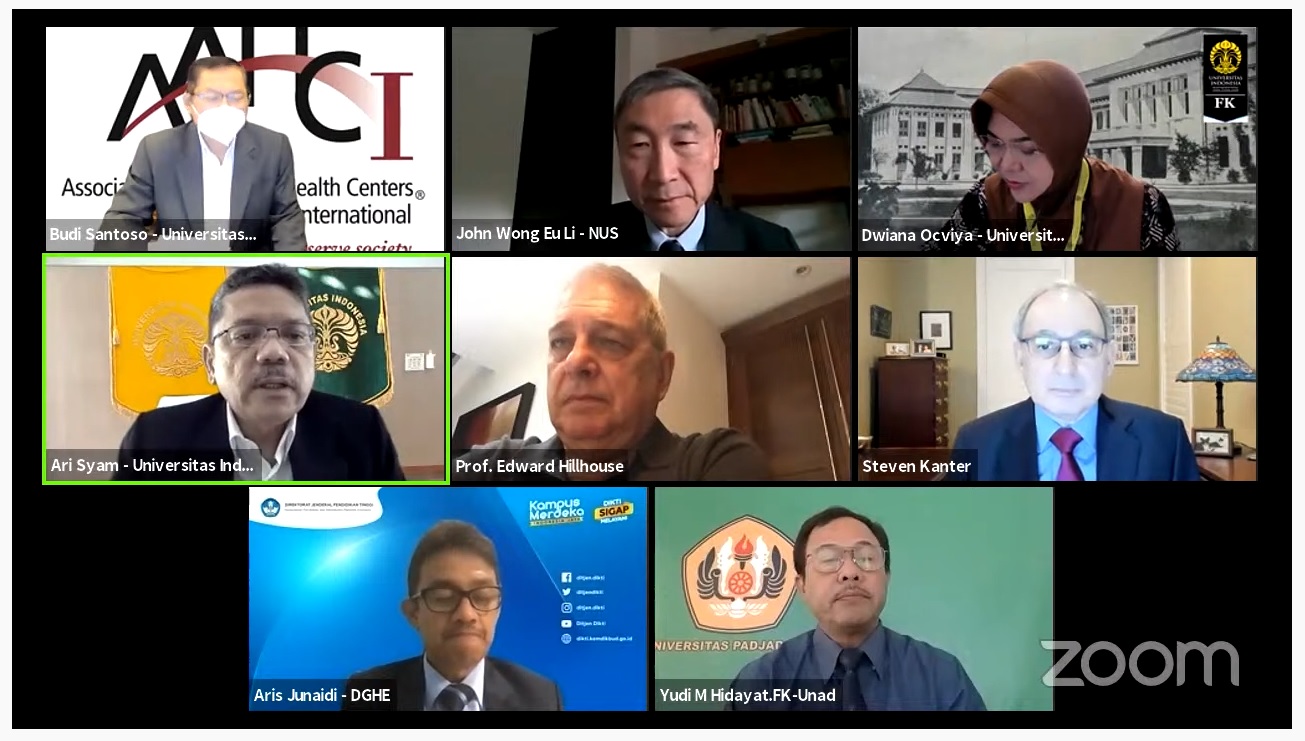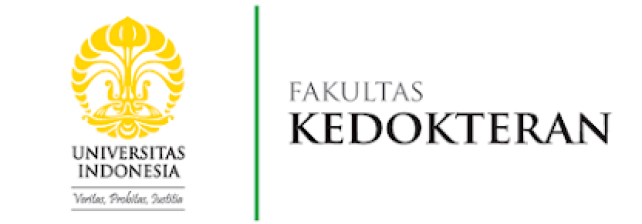The Faculty of Medicine Universitas Indonesia (FMUI), in its capacity as the Association of Academic Health Center International (AAHCI) Regional Office Southeast Asia, once again held an international webinar with the theme “AAHCI-SEA Webinar: The Academic Health System Concept” on 22 February 2021.
This webinar was held to give an overview about the Academic Health System (AHS) and as a discussion forum regarding the effort to strengthen collaboration within the AHS by looking at the examples of how the AHS is run in Indonesia.
The webinar was started with an opening remark from the Dean of FMUI, who is also the Coordinator of AHS UI and the Regional Ambassador of AAHCI-Southeast Asia, Prof. Dr. dr. Ari Fahrial Syam, Sp.PD-KGEH, MMB. In his opening remark, Prof. Ari Fahrial Syam delivered his conviction that AHS is a crucial component in a health system both nationally and internationally. “AHS is a concept to integrate academic and research in a health system, so that health service can be delivered to the community without hindrance,” said Prof. Ari Fahrial Syam.

Afterwards, the Rector of the Universitas Indonesia, Prof. Ari Kuncoro, S.E., M.A., Ph.D. gave his welcome address. According to Prof. Ari Kuncoro, AHS concept that is only initiated in several universities in Indonesia can continuously grow and is able to develop the national health system. “I hope that this webinar can give us understanding on how AHS is to be implemented in this rapidly changing environment,” remarked Prof. Ari Kuncoro.
Prof. dr. Abdul Kadir, Ph.D, Sp.THT-KL(K), MARS as the General Director of Health Services of the Ministry of Health of Indonesia stressed the importance of harmony between education and health institutions. “The aim of education ought to meet the needs of the health service. Besides, education must also be standardized to ensure a high-quality outcome. Therefore, AHS will be of great benefit to all stakeholders, be it the ever-developing academic institutions, the health institutions that will deliver an even better quality of health service, or the health financial sector that will be more efficient,” said Prof. Abdul Kadir.
Prof. drh. Aris Junaidi, Ph.D, as the Director of Quality Assurance, Ministry of Research, Technology and Higher Education of Indonesia, also gave an introductory remark. Prof. Aris expressed his support for the AHS in his committee along with the Ministry of Health and Ministry of Education and Culture. “Together, this committee is committed to continuously strengthen the AHS in Indonesia, as well as to encourage the collaboration between the faculty of medicine and teaching hospitals. This support for the AHS is also expressed in the presidential decree to facilitate policy between ministries. Moreover, it is also to encourage the AHS pilot project to join the international organization to establish international network and gain advocacy support for the advancement of each AHS.
This webinar presented three speakers and they were (1) Dr. Steven L. Kanter, MD, President and CEO of the AAHC/I; (2) Prof. John Eu Li Wong, FACP, FAMS, FRCP, MBBS, Senior Vice President, National University of Singapore (NUS) and Senior Advisor, National University Health System, Singapore; (3) Prof. Edward Hillhouse, MD, Ph.D, BSC, MBBS, Emeritus Professor of Medicine and Former Dean of University of Leeds, UK, AIM Consultant, AAHC/I. Furthermore, the moderator of this event was Prof. Dr. dr. Dwiana Ocviyanti, Sp.OG(K), MPH as the Vice Dean for Education, Research, and Student Affairs, Faculty of Medicine Universitas Indonesia.
The first topic was presented by Dr. Steven with the theme “The Concept of Academic Health Center and its Correlation with AHS Implementation.” According to Dr. Steven, the Academic Health Center (AHC) has several differences from the AHS, of which the AHC generally consists of the faculty of medicine and one or more teaching hospitals, as well as other health science institutions. When AHC develops and establishes a close collaboration with other hospitals and public health facilities, this is called the AHS. “What is important is despite the varying structures, the close connection between academic institutions and health facilities will eventually yield better physicians, more excellent researchers, higher quality of patient care and greater economic growth,” said Dr. Steven.
Thereafter, Prof. John presented the topic “The Role of AHC in the Academic Health System: Best Practices from NUHS.” He stated that the system has been adopted by Singapore for more than 10 years and today it has shown numerous benefits. “It started initially from several hospitals and several schools within NUS. Afterwards, we continued to develop and involved various polyclinics as the primary health services in the community. Today we are given the mandate to take care of the health service of the Western part of Singapore.” Furthermore, according to Prof. John, the success of AHS can be assessed from the ratio of the quality of health service delivered to the cost spent on it. The target is to improve the quality of health service, but with less cost. Patient satisfaction is assessed from the survey given to them in several settings in the hospital. And through this combination the system in NUHS was able to suppress COVID-19 cases in Singapore with a relatively low fatality rate. Moreover, various innovations were developed, such as nasopharyngeal swab that was self-sufficiently produced in Singapore. Also, several diagnostic and therapeutic tools are now in current development to overcome COVID-19.
The last speaker was Prof. Edward and he brought the topic “Confronting Challenges of Establishing an Academic Health System: Perspectives from an AIM Consultant.” He presented eight main challenges that will be faced to form an AHS. One of which was on the continuation of the organization and here Prof. Edward said, “The missions of universities and hospitals are surely different. However, the academic and health institutions must come into agreement that the main goal of this system is to improve the quality of life of the patients being cared for.”
The webinar was then continued with a panel session in which representatives from five universities shared their experience in managing the newly implemented AHS in Indonesia. Those five universities were Universitas Indonesia, Universitas Gadjah Mada, Universitas Airlangga, Universitas Hasanuddin, dan Universitas Padjadjaran.
Around 350 people participated in this webinar and the recording of this webinar can be accessed on AAHC YouTube on https://youtu.be/eHC5CaKU12c.
(FKUI Public Relations)
